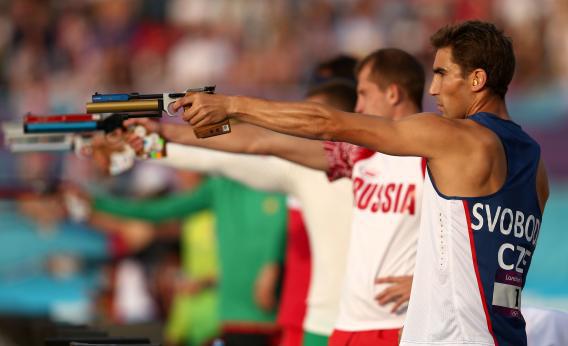Baron Pierre de Coubertin, the founder of the modern Olympics, would be very upset to know that modern pentathlon has been relegated to the tail end of the London Games, alongside mountain biking and racewalking and all the other weird sports that nobody wants to watch. Modern pentathlon, which began Saturday and finishes today, tests athletes’ skills in five different disciplines—running, swimming, fencing, shooting, and riding. Coubertin invented the sport, and considered it “a veritable consecration of the complete athlete.”
Coubertin was one of those impractical gentlemen idealists seemingly so common a century ago. He founded the Olympics in part to bring about world peace by assembling sporting gentlemen from each nation and pitting them against each other in good-natured competition. In a speech to the Sorbonne in 1892, Coubertin articulated his vision:
It is clear that the telegraph, railways, the telephone, the passionate research in science, congresses and exhibitions have done more for peace than any treaty or diplomatic convention. Well, I hope that athletics will do even more. Those who have seen 30,000 people running through the rain to attend a football match will not think that I am exaggerating. Let us export rowers, runners, and fencers; there is the free trade of the future, and on the day when it is introduced within the walls of old Europe the cause of peace will have received a new and mighty stay.
The modern pentathlon was part of that scheme. As Coubertin conceived it, the event would test the skills required of a modern cavalry officer. Part of the idea was that, having faced off against each other in the sporting arena, bonds of brotherhood would be forged between the participants, who would perhaps leave the Olympics less likely to wage war.
The trouble was that nobody else liked the idea. Coubertin proposed the event multiple times, he wrote, and the proposal “had always been greeted with a lack of understanding and almost hostility.” (Coubertin had a bunch of weird ideas that nobody else liked. At one point, he wanted to award prizes to the most impressive accomplishments in hunting, mountain-climbing, and aviation in the years between Olympiads. “In all three cases,” he wrote, “complete indifference and sometime even positive ill-will without discernible cause” greeted his proposal.)
He finally convinced the IOC to give the modern pentathlon a try, and the event debuted at the Stockholm Games in 1912. A Swede named Gosta Lilliehook won the gold medal, as well as a special trophy of Coubertin’s own design: a solid gold plaque “decorated with bas-relief figures designed by the well-known Swedish carver Lindberg,” to be awarded to the modern pentathlon champion in each successive Olympics. George Patton competed for the United States, and afterwards said, “Each man did his best and took what fortune sent them like a true soldier, and at the end we all felt more like good friends and comrades than rivals in a severe competition.” Coubertin was thrilled with the event, too, writing that “from a purely athletic perspective, the modern pentathlon marked the highest peak of the Olympiad. Nowhere else was muscular effort as intense, nor the selflessness of the athletes as great.”
Today, modern pentathlon is seen as “an archaic, exclusive sport that is too expensive to run in many developing countries,” and pentathletes are among the most obscure athletes at the games. (This year’s bronze medalist, Hungary’s Adam Marosi, is a “bespectacled youngster” who says he likes to “read books, have fun with my PlayStation, drive a car, and play with my dog, and, ah yes, I love listening to music, especially the AC/DC.”) The event isn’t even a true pentathlon any more—in 2008, the Union Internationale de Pentathlon Moderne combined shooting and running into a single event. They also replaced the pistols with futuristic laser pistols, probably in an attempt to attract the Tron: Legacy demographic.
With relatively few competitors and little outside interest, modern pentathlon might not make it past the London Games. But as one of the few surviving elements of the days when the Olympics were a crackpot tribute to naïve, beautiful idealism, the modern pentathlon will be missed by me if it goes. I suspect Coubertin would hate the modern Olympics, filled as they are with professional athletes who train year-round in their respective disciplines. Even back in the Olympics’ early days, Coubertin criticized athletic specialization, considering it “fruitless … as far as manly improvement is concerned.”
“The individual who truly deserves that name ‘Olympian’ is the competitor in the modern pentathlon,” wrote Coubertin in 1918. “Now that is real all-around athleticism.”
